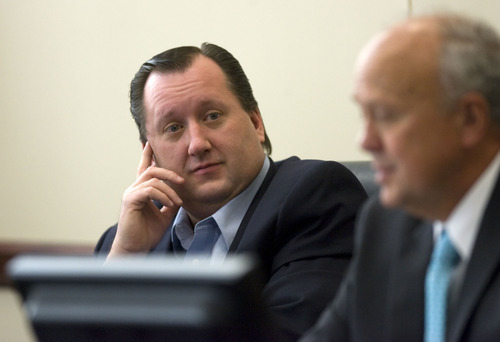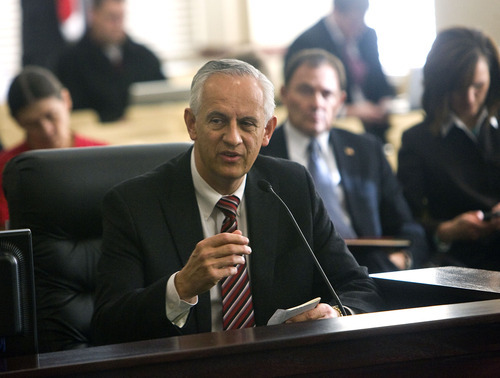This is an archived article that was published on sltrib.com in 2011, and information in the article may be outdated. It is provided only for personal research purposes and may not be reprinted.
Days before the start of the 2011 session, the Legislature's lead attorney, John Fellows, stood before House Republicans, including a swarm of new lawmakers, and gave them this advice on how to deal with records: "Delete early and delete often."
It was advice Rep. John Dougall, R-Highland, said he was surprised to learn that several colleagues were following — and drove home the point that Utah's records law was in need of repair.
"Coming out of that and seeing things, talking to colleagues who said, 'I delete everything every day.' Really? Really?" Dougall said of a practice made possible because legislators have largely exempted themselves from state records laws. "If this is really what we've come to, there's a problem."
In trying to solve the perceived problems with the Government Records Access and Management Act (GRAMA), however, Dougall has kicked a hornet's nest, and now Gov. Gary Herbert and state lawmakers are scrambling toward a likely repeal when they meet Friday afternoon.
Dougall says he has no regrets about pushing HB477, or the outcome — even though he will sponsor the legislation repealing it.
"Pushing the bill forward, first and foremost, was to force a dialogue about GRAMA in the 21st century. What is the nature of confidentiality for citizens? To what extent should taxpayers have to pay for expansive requests?" he said. "The fact I pushed a bill and it passed really focuses people's attention that we can't avoid this. We have to have the discussion."
Dougall left that House Republican caucus in January believing changes in the law were needed. After a meeting with House Speaker Becky Lockhart, R-Provo, and House leadership a few weeks into the legislative session, he asked attorneys in the Office of Legislative Research and General Counsel to begin drafting his bill to amend GRAMA.
The lawyers had been cobbling together a list of GRAMA concerns for some time, incorporating a 2009 bill to reform the records act that didn't pass. The attorneys played a key role in helping make the case for HB477.
"It's something that had been on a low boil of agitation," Dougall said. "I could be wrong, but I still think it was right, in terms of timing."
There was concern about a Utah Supreme Court ruling — in which the court ordered the release of a sexual-harassment investigation conducted by Salt Lake County — that Senate President Michael Waddoups, R-Taylorsville, said "overstretched" the GRAMA law and was "a villain" in the records debate.
In addition, attorneys told legislative leaders that the volume of records requests had become overwhelming. They had received 10 requests since the start of the session and had spent 400 hours during the previous year responding to them — one single request taking nearly 300 hours.
And attorneys only expected the number of requests to increase, Waddoups said. Lawmakers were told that bills wouldn't be drafted and legislators would have to hire at least one, and possibly two, full-time attorneys to deal with GRAMA requests.
The House took the lead in formulating the GRAMA revisions, Waddoups said. Dougall sought input from House colleagues and legislative leaders, and by late February, he had a draft of the bill in hand.
He said he got input from the Attorney General's Office and Governor's Office, and he presented the bill to a joint meeting of House and Senate Republican leaders, who agreed to present it in their respective closed caucuses.
On Feb. 28, Dougall, Lockhart and Waddoups met with Gov. Gary Herbert to present him with highlights of the bill before the governor left for Washington, D.C., to attend a national governors meeting.
An email obtained by The Salt Lake Tribune through GRAMA indicates that afternoon, Herbert's attorney, John Pearce, was sent a draft of the bill labeled, "Version 6." Pearce recommended some changes to it and was later sent a revised "Version 9."
On March 1, Dougall told Democratic leaders of his plans for GRAMA and presented his bill to colleagues during a closed lunchtime caucus, with the help of Fellows. Across the Capitol, Sen. Lyle Hillyard, R-Logan, made a similar presentation.
Dougall said that without the support of both chambers, he wouldn't have plowed ahead with the bill, but both embraced it by large margins.
HB477 was made public for the first time that afternoon.
Doug Foxley, a lobbyist for the Utah Media Coalition, was surprised when it popped up. In a Capitol where secrets are hardly ever kept, he was "amazed how tight-lipped this one was."
Foxley contacted attorneys and representatives of the media coalition and set up a meeting with Dougall.
"It was not the most cordial meeting we've ever been to," he said.
Herbert, still in Washington, said he called legislative leaders to voice his worries about the bill.
"I expressed concerns — in fact, made a phone call from Washington, D.C., and talked with members of leadership that I was not comfortable with what they were doing," Herbert said Thursday. "I was surprised when I came back from Washington that they had decided to move ahead."
But forge ahead they did — and with considerable haste.
An analysis by Brigham Young University political-science professor Adam Brown indicated that HB477 moved faster than 99.5 percent of the bills passed by the Legislature, excluding budget bills and a handful of resolutions.
Dougall insists he wasn't being sneaky.
"A GRAMA issue, you don't sneak through and you don't try to sneak something through with a committee hearing," Dougall said. He said he felt like the bill needed to be pushed through in order to encourage debate on the issue.
Foxley isn't buying it.
"Those are the stated reasons, but I think, based on past experience, they decided they were going to wait until the end and spring it out, and hope there were 72 hours of bad stories and then they could move on," he said.
The bill breezed through perfunctory House and Senate committee hearings and passed the House 61-12 the next day, with bipartisan support, and the day after that, it came before the full Senate.
Ric Cantrell, chief deputy of the Senate, in a text message to Waddoups obtained through a GRAMA request, warned him that it might be a mistake to rush ahead with the bill without making a case to the public.
Nonetheless, senators, who were encouraged not to debate the bill, ended up approving it 23-6, and it appeared headed for immediate enactment.
But the public outrage was quick and decisive.
Hundreds of angry phone calls and emails flooded the Governor's Office, records suggest.
Herbert says that, in the face of resounding votes in the House and Senate, he feared he couldn't veto the bill, or it would be reversed by the Legislature. So he cut a deal with legislative leaders to postpone its effective date until July 1.
The pressure didn't let up, and a referendum seeking to repeal the bill was attracting hundreds of signatures.
Herbert decided to call a special session to repeal the bill, a decision that House Republicans agreed to this week, and into which Senate Republicans are reluctantly being dragged.
"I would rather not be doing this tomorrow, but seeing as we are, we're going to make lemonade out of this, and it will be a good thing," Waddoups said. "At the end of the day, we're going to have a good product. It's going to be better than [HB]477. It's going to be better than the original [GRAMA] law. But it's messy." A special sessionwith all the trimmings
The Legislature's special session is scheduled to begin at noon in the Capitol, with the repeal of HB477 as the sole item on the agenda set by Gov. Gary Herbert.
Senate Republicans plan to meet in closed caucus at 10 a.m.
Opponents of HB477 have planned a rally for 11 a.m. in the Capitol rotunda. —
Highlights of HB477
Repeals "intent language" that says government records are presumed to be public unless it can be shown they should be private.
Exempts text messages, instant messages, "PIN" messages and video chats, regardless of content.
Exempts personal notes related to a public servant's professional service.
Exempts any drafts of policies contemplated by the governor.
Allows charges of attorney fees, staff time, administrative costs and "overhead" for records requests.
Exempts any document prepared by a legislator, or communications between legislators or staff unless it "provides notice of official legislative action."
Reiterates that denials of GRAMA requests to the Legislature can't be reviewed by the state Records Committee.
Removes presumption that empirical data contained in drafts of documents are public record.
Makes the personal information of a Senate-approved nominee private.
Expands the protection of documents relating to a topic that might be the subject of litigation.





